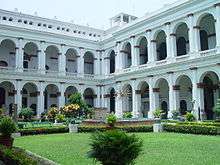Anthropological Survey of India
 The Indian Museum, Kolkata, the headquarters of AnSI | |
| Abbreviation | AnSI |
|---|---|
| Formation | 1945 |
| Headquarters | Kolkata |
Parent organisation | Ministry of Culture, Govt. of India |
| Website | http://www.ansi.gov.in/default.htm |
Anthropological Survey of India (AnSI) is the apex Indian organisation involved in anthropological studies and field data research for human and cultural aspects, working primarily in the fields of physical anthropology and cultural anthropology.[1] While maintaining a strong focus on indigenous populations, it also attempts to document the cultures of other communities and religious groups.
History
Anthropological Research in India was founded 1945 in Varanasi and shifted to the Indian Museum at Calcutta in 1948.[2]
In 1916, the Zoological and Anthropological sections of the Museum together became a new entity the Zoological Survey of India. Later, in 1945, the Anthropology section formed into an independent body, the Anthropological Survey of India (AnSI),[3] with Biraja Sankar Guha as the initial director and Verrier Elwin, Deputy Director.
Overview
| Directors |
|---|
|
Operating under the Ministry of Culture, Government of India, it is headquartered in Kolkata and has branches in Port Blair (Andaman and Nicobar), Shillong, Dehra Dun, Udaipur, Nagpur (with Central Library of AnSI), and Mysore (established in 1960),[4] in addition to two field stations at Jagdalpur in Bastar district, Chhattisgarh and at Ranchi, Jharkhand. The Central Museum of AnSI is located at Kolkata, whereas Zonal Anthropological Museums at six regional and one sub-regional centres.
See also
Further reading
- Singh, Kumar Suresh (November 2000). "A perspective on the ASI". Seminar. Retrieved 2011-11-09.
References
- ↑ Anthropological Survey of India Archived June 25, 2010, at the Wayback Machine. Department of Education. Govt. of India.
- ↑ Anthropological Survey of India history at anthsi.com
- ↑ Anthropological Survey of India (The Andamanese by George Weber).
- ↑ Anthropological Survey of India (ASI), Mysore Archived June 22, 2011, at the Wayback Machine. Swedish South Asian Studies Network, Lund University, November 28, 2007.